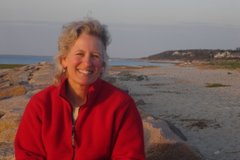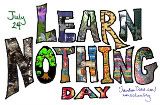
When I was in college and graduate school, I was drawn to Carl Rogers' writings. His philosophy of client-centered therapy deeply resonated with me those many years ago and guided me toward my approach to helping relationships as a professional social worker. He was considered controversial in his time, even radical, because he shunned the scientific models of psychology which stressed the quantitative shaping of behavior through more external means rather than using the therapeutic relationship as a foundation for client-motivated change.
I had forgotten about him. Or I thought so. Until I came upon one of his books in the library the other day. On Becoming A Person was published in 1961, near the end of Carl Rogers' career as a psychologist. The book is a compilation of writings and talks that reveal his journey toward the person he had become.
I am awed by his grace and genuineness and have found renewed favor for his words. But what I found most remarkable were his perspectives on teaching and education. Chapter 13 is entitled "Personal Thoughts on Teaching and Learning." It is derived from a presentation he gave at Harvard in 1958 where he was requested to expand his ideas to the concept of "student-centered teaching." I will not go into too much detail, but wanted to share some of his thoughts here:
"It seems to me that anything that can be taught to another is relatively inconsequential, and has little or no significant influence on behavior."
"I have come to feel that the only learning which significantly influences behavior is self-discovered, self-appropriated learning."
"When I try to teach, as I do sometimes, I am appalled by the results, which seem a little more than inconsequential, because sometimes the teaching appears to succeed. When this happens I find that the results are damaging. It seems to cause the individual to distrust his own experience, and to stifle significant learning. Hence I have come to feel that the outcomes of teaching are either unimportant or hurtful.....This is frankly troubling."
"...I realize that I am only interested in being a learner, preferably learning things that matter, that have some significant influence on my own behavior."
He goes on to say expound on the implications of these thoughts:
"Such experience would imply that we would do away with teaching. People would get together if they wished to learn..We would do away with examinations. They measure only the inconsequential type of learning."
"We would do away with degrees...a degree marks an end or a conclusion of something, and a learner is only interested in the continuous process of learning."
And I am only scratching the surface.
This fascinates me. That I had not made the connection before about the type of professional I was. About the type of person I already was before I came to unschooling. The seeds of this thinking were planted long ago by Carl Rogers and by my own experience in school, in relationships, and as a professional. It comforts me to find how deeply the tenets of unschooling are rooted in my person, and that I was almost unwittingly drawn to this more radical, yet, to me, so sensible way of raising children.
If you have read this far and you are not yawning....thank you. Perhaps this is a bit too narrowly personal for blogging, but there you have it.
If you are interested in reading more excerpts from this book they are here.







3 comments:
NOW you tell me blogs may not be for the "narrowly personal". Too late for my blog!
I thought that was a fascinating post. I wonder if Rogers wrote anything about "people getting together" to learn -- and about the kind of environment that fosters "self-discovered, self-appropriated learning"? My boys are teens now, and I can see how being in a group with their friends -- gaming, mostly -- they all share their experiences and learn from each other. I wish that that kind of relaxed group learning was more available. Not learning subjects as taught in school (like homeschool writing groups or book groups), but getting together to share experiences and knowledge of ... anything. Stuff. :)
A 24 hour coffee house for teens and young adults. With computers. And a pool table.
Now I'm rambling ...
Hi Laura,
Thanks for your comment.
Rogers does write about being a part of a discussion group which ultimately led him away from a career as a minister and toward psychology. He felt that the open discussion helped him to clarify his beliefs and his values so that he was able to choose a more suitable path. His school radically offered credits for this group which had no grades or tests. Just talking/sharing.
By the way, I consider your blog quite widely appealing, while still remaining personal. One of my favorites.
I hadn't read Carl Rogers' writing for a very long time. Thanks for the gentle and powerful reminder. I also like Joseph Chilton Pierce. Have you read his work?
Post a Comment